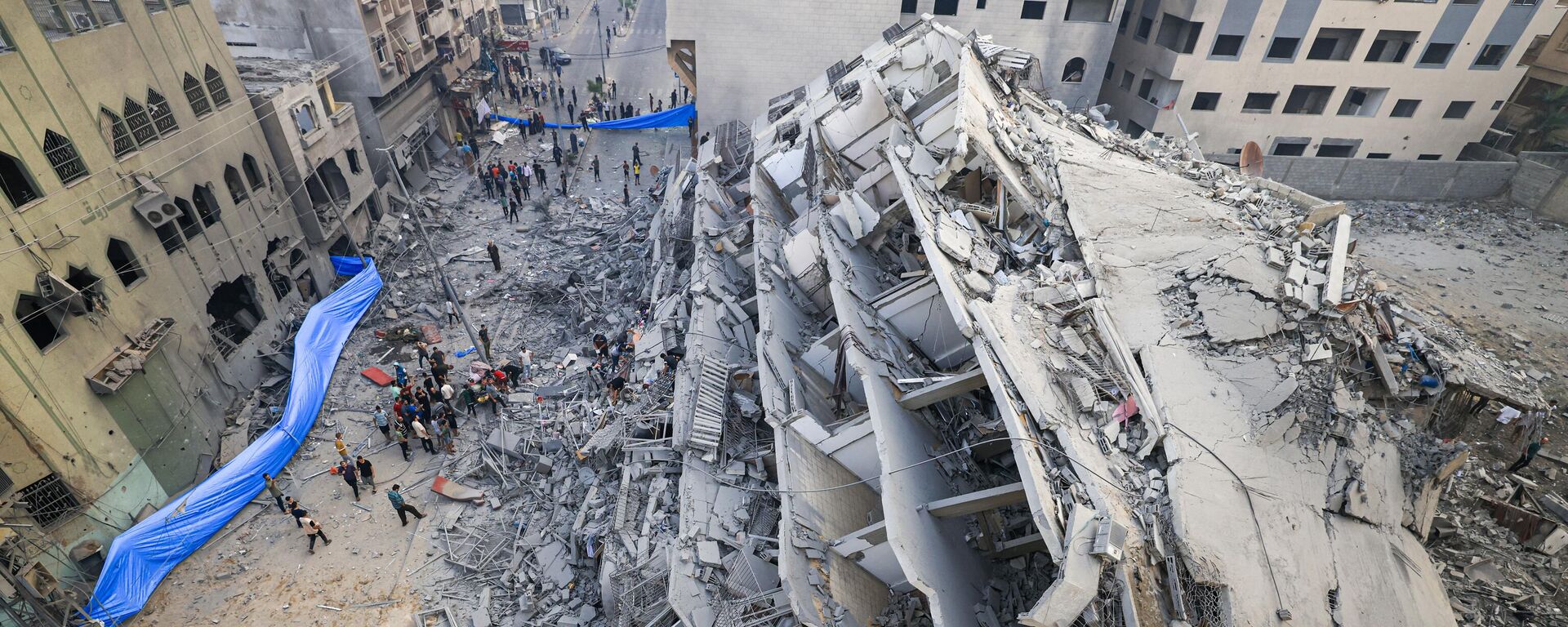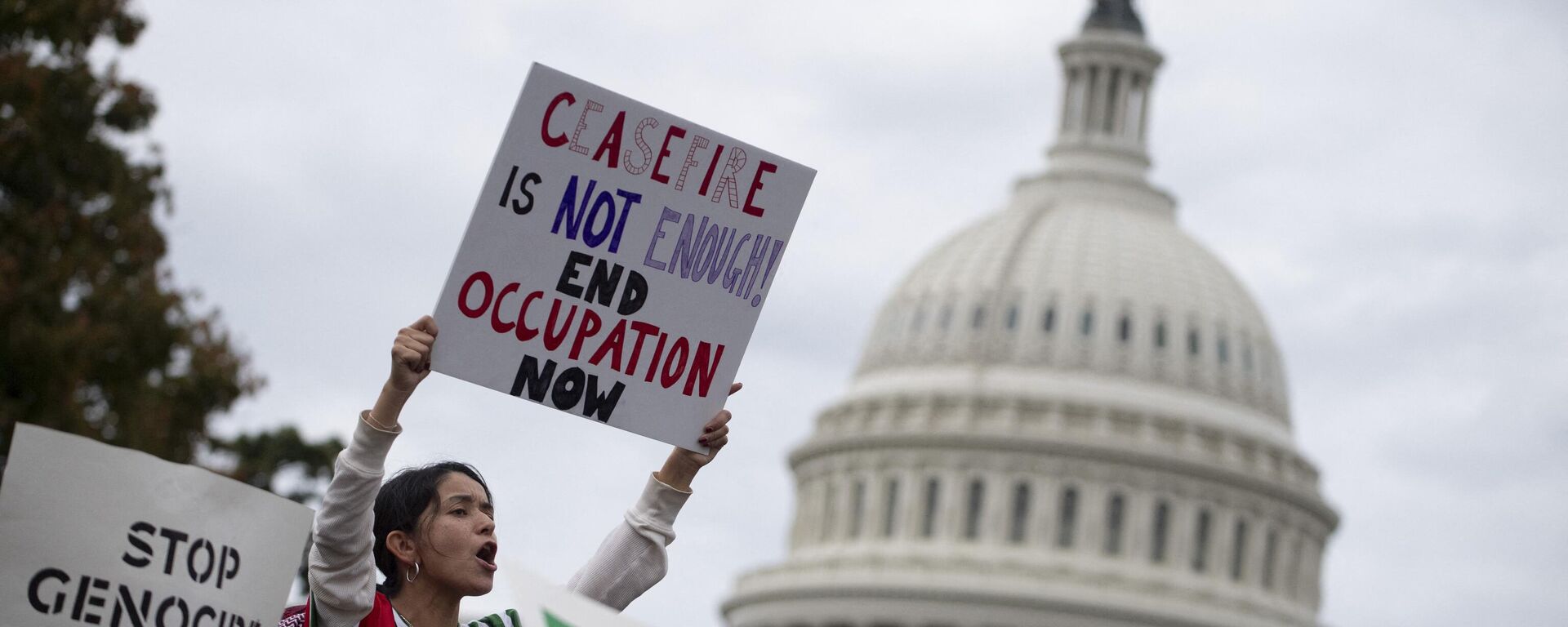https://sputnikglobe.com/20231025/israel-and-us-fear-new-humiliation-in-ground-invasion-of-gaza-1114468621.html
Israel and US Fear New Humiliation in Ground Invasion of Gaza
Israel and US Fear New Humiliation in Ground Invasion of Gaza
Sputnik International
Israel's threatened ground offensive in Gaza is still on hold, almost three weeks after the devastating Hamas raid into southern Israel. Sam Husseini and Elijah Magnier argued that fear of another defeat was holding Israel back.
2023-10-25T18:12+0000
2023-10-25T18:12+0000
2023-12-05T09:23+0000
analysis
israel
us
palestine
sam husseini
elijah j. magnier
lebanon
hamas
israel defense forces (idf)
hezbollah
https://cdn1.img.sputnikglobe.com/img/07e7/0a/0b/1114102882_0:205:3072:1933_1920x0_80_0_0_24d9e554075d00c1e372efb2392c22fb.jpg
Israel fears a second military defeat by Hamas if it goes ahead with an offensive to destroy the Palestinian group and free hundreds of hostages, two journalists say.Israeli Prime Minister Benjamin Netanyahu has called up some 350,000 military reservists after a surprise Hamas attack from the Gaza Strip left almost 300 Israeli Defense Forces (IDF) troops and over 1,000 civilians dead, with more than 200 taken captive.Earlier this week, US media reported that US President Joe Biden's government was pressuring Israel to delay its ground invasion in the hope of negotiating the release of dual US-Israeli nationals taken hostage there by the Hamas movement.But journalist Sam Husseini told Sputnik that it was not Washington holding the IDF back, but Israel's fear of taking heavy casualties in the assault.He said Netanyahu's vow to destroy Hamas in return for the October 7 attacks was merely a "pretext" for ethnic cleansing and a land-grab."Israel is doing what it's long wanted to do, which is to go after the civilian Palestinian population, to decimate Palestinian society as much as possible in order to drive out more and more Palestinians from their lands so they can take it, so they can take the resources, the gas reserves off the coast of Gaza, for example, as well as just another ethnic cleansing as they did in 1948, 1967," Husseini said.He also focussed on the release of two elderly Israeli women held hostage by Hamas in Gaza. One of the women, Yukhfed Livshitz, told reporters how the militants had treated her and others humanely and with dignity, promising not to harm them and even bringing a doctor to check on them every few days.The journalist said that surprising turn of events was the motive for the IDF's "Hannibal Directive" that an Israeli is "better dead than abducted" by Israel's enemies. He pointed to accounts from Israeli survivors of the October 7 attack on Israeli settlements near Gaza that civilians were killed by IDF troops in a panic and botched response."There are increasing reports coming out that the Israeli a lot of the Israeli civilians that were killed on October 7th were actually killed by Israeli forces, that the Israeli forces came in and ended up killing a lot of Israelis in the process, and that Hamas, more than anything, was attempting to target Israeli military," Husseini said.War reporter Elijah Magnier pointed out to Sputnik that the IDF had, by its own admission, dropped 4,000 tons of high-explosive bombs on Gaza in a few days — a quarter of the explosive power of the atomic bomb dropped on Hiroshima.Despite accusations by Israel and its Western allies that Hamas is using Gaza's 2.3-million inhabitants as human shields, the war correspondent noted that "we have not heard one complaint from the population against Hamas." "I understand this feeling because I have been in many wars that Israel carried out in Lebanon and in Gaza," Magnier recounted. "People think only with a lot of emotion against those who are bombing them. They don't think what has triggered the Israeli reaction, particularly in the case of the Palestinians who have been living [for] 73 years under the occupation of Israel."He pointed out that four previous Israeli assaults on Gaza had failed to neutralize the Islamic resistance movement."In every war of the Israeli attack on Gaza and these four times, never ever have they managed to cripple Hamas or to turn the population against Hamas," Magnier said. "We have seen devastating bombardment of Gaza in the past, particularly in 2012 and 2014, and the population was still not against Hamas. So the Israelis understand very well the consequences of their bombardments."The Palestinian Health Ministry reported on Wednesday that more than 6,500 people had been killed and 19,000 injured since October 7 by Israeli bombing raids on Gaza and IDF incursions into the occupied West bank. It said 70 percent of those killed were elderly people, women and children — the latter accounting for 2,500 of the dead."Hamas is present under the ground and above the ground is part of the population, which is exactly like Hezbollah in Lebanon, where the Israelis also promised as so many times to cripple Hezbollah's capability," he continued. "We've seen Hezbollah coming back stronger and now we see Hamas coming back stronger."For more in-depth analysis of current affairs, tune in to our Sputnik Radio shows.
https://sputnikglobe.com/20231024/mask-off-for-us-as-it-opposes-chinese-peace-mission-in-the-middle-east-1114449193.html
https://sputnikglobe.com/20231025/us-will-have-blood-on-its-hands-if-plan-for-israel-has-no-de-escalation---ex-egyptian-fm-1114464205.html
israel
palestine
lebanon
gaza strip
Sputnik International
feedback@sputniknews.com
+74956456601
MIA „Rossiya Segodnya“
2023
James Tweedie
https://cdn1.img.sputnikglobe.com/img/07e4/08/1c/1080307270_0:3:397:400_100x100_80_0_0_7777393b9b18802f2e3c5eaa9cbcc612.png
James Tweedie
https://cdn1.img.sputnikglobe.com/img/07e4/08/1c/1080307270_0:3:397:400_100x100_80_0_0_7777393b9b18802f2e3c5eaa9cbcc612.png
News
en_EN
Sputnik International
feedback@sputniknews.com
+74956456601
MIA „Rossiya Segodnya“
Sputnik International
feedback@sputniknews.com
+74956456601
MIA „Rossiya Segodnya“
James Tweedie
https://cdn1.img.sputnikglobe.com/img/07e4/08/1c/1080307270_0:3:397:400_100x100_80_0_0_7777393b9b18802f2e3c5eaa9cbcc612.png
israeli bombing of gaza, hamas attack on southern israel, us support for israeli war crimes
israeli bombing of gaza, hamas attack on southern israel, us support for israeli war crimes
Israel and US Fear New Humiliation in Ground Invasion of Gaza
18:12 GMT 25.10.2023 (Updated: 09:23 GMT 05.12.2023) Israel's threatened ground offensive in Gaza is still on hold, almost three weeks after the devastating Hamas raid into southern Israel. Independent journalist Sam Husseini and veteran war correspondent Elijah Magnier argued that fear of another defeat was holding Israel back.
Israel fears a second military defeat by Hamas if it goes ahead with an offensive to destroy the Palestinian group and free hundreds of hostages, two journalists say.
Israeli Prime Minister Benjamin Netanyahu has called up some 350,000 military reservists after a surprise Hamas attack from the Gaza Strip left almost 300 Israeli Defense Forces (IDF) troops and over 1,000 civilians dead, with more than 200 taken captive.
Earlier this week,
US media reported that US President Joe Biden's government was pressuring Israel to delay its ground invasion in the hope of negotiating the release of dual US-Israeli nationals taken hostage there by the Hamas movement.
But journalist
Sam Husseini told
Sputnik that it was not Washington holding the IDF back, but Israel's fear of taking heavy casualties in the assault.
"I'm not positive that Israel wants to go in sooner rather than later," Husseini said. "That seems to be the case, but it's quite possible that Israel wants to delay because they want to bomb Gaza as much as possible and starve Gaza as much as possible to make any ground invasion easier."
He said Netanyahu's vow to destroy Hamas in return for the October 7 attacks was merely a "pretext" for ethnic cleansing and a land-grab.
"Israel is doing what it's long wanted to do, which is to go after the civilian Palestinian population, to decimate Palestinian society as much as possible in order to drive out more and more Palestinians from their lands so they can take it, so they can take the resources, the gas reserves off the coast of Gaza, for example, as well as just another ethnic cleansing as they did in 1948, 1967," Husseini said.
He also focussed on the release of two elderly Israeli women
held hostage by Hamas in Gaza. One of the women, Yukhfed Livshitz, told reporters how the militants had treated her and others humanely and with dignity, promising not to harm them and even bringing a doctor to check on them every few days.
The journalist said that surprising turn of events was the motive for the IDF's "Hannibal Directive" that an Israeli is "better dead than abducted" by Israel's enemies.
"Israel basically says we're going to kill anyone Hamas or any other Palestinian group takes hostage," Husseini stressed. "The standard interpretation of that has been that they don't want Hamas to take to be taking people in that to be leverage over Israel. But there's another interpretation, which is that they don't want these people to come out alive to say Hamas treated us perfectly fine."
He pointed to accounts from Israeli survivors of the October 7 attack on Israeli settlements near Gaza that civilians were killed by IDF troops in a panic and botched response.
"There are increasing reports coming out that the Israeli a lot of the Israeli civilians that were killed on October 7th were actually killed by Israeli forces, that the Israeli forces came in and ended up killing a lot of Israelis in the process, and that Hamas, more than anything, was attempting to target Israeli military," Husseini said.

24 October 2023, 14:34 GMT
War reporter
Elijah Magnier pointed out to
Sputnik that the IDF had, by its own admission, dropped 4,000 tons of high-explosive bombs on Gaza in a few days — a quarter of the explosive power of the atomic bomb dropped on Hiroshima.
"Israel used an equivalent of a quarter of a nuclear bomb," he stressed. "And then the later days, they no longer announce [it] because of the reaction of the world to this devastating amount of explosive on around [a] 350-square-kilometer city that is completely isolated and completely surrounded."
Despite accusations by Israel and its Western allies that Hamas is using Gaza's 2.3-million inhabitants as human shields, the war correspondent noted that "we have not heard one complaint from the population against Hamas."
"I understand this feeling because I have been in many wars that Israel carried out in Lebanon and in Gaza," Magnier recounted. "People think only with a lot of emotion against those who are bombing them. They don't think what has triggered the Israeli reaction, particularly in the case of the Palestinians who have been living [for] 73 years under the occupation of Israel."
He pointed out that four previous Israeli assaults on Gaza had failed to neutralize the Islamic resistance movement.
"In every war of the Israeli attack on Gaza and these four times, never ever have they managed to cripple Hamas or to turn the population against Hamas," Magnier said. "We have seen devastating bombardment of Gaza in the past, particularly in 2012 and 2014, and the population was still not against Hamas. So the Israelis understand very well the consequences of their bombardments."
The Palestinian Health Ministry reported on Wednesday that more than
6,500 people had been killed and 19,000 injured since October 7 by Israeli bombing raids on Gaza and IDF incursions into the occupied West bank. It said 70 percent of those killed were elderly people, women and children — the latter accounting for 2,500 of the dead.
"How many of the 40,000 of Hamas militants has Israel managed to kill? 500?" Magnier demanded. "Let's exaggerate. Let's say 1,000 [from] the total of 40,000. Of course, Israel is not crippling Hamas' capability."
"Hamas is present under the ground and above the ground is part of the population, which is exactly like Hezbollah in Lebanon, where the Israelis also promised as so many times to cripple
Hezbollah's capability," he continued. "We've seen Hezbollah coming back stronger and now we see Hamas coming back stronger."

25 October 2023, 05:24 GMT
For more in-depth analysis of current affairs, tune in to our Sputnik Radio shows. 




